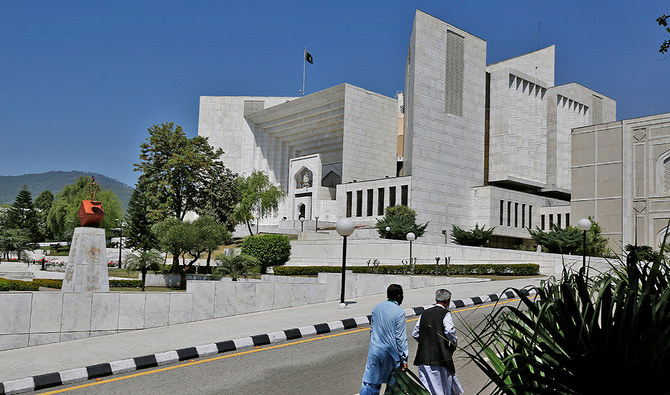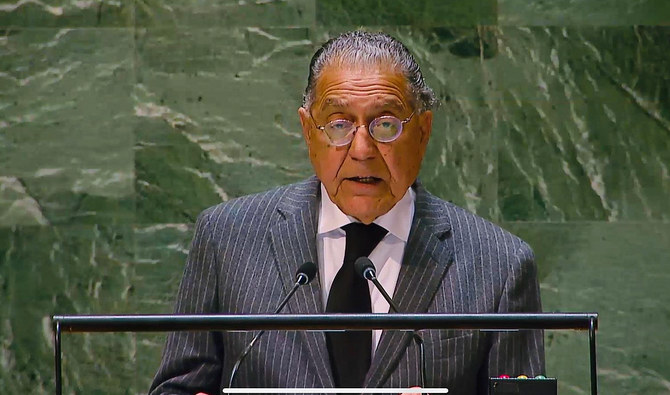ISLAMABAD: Chief Justice of Pakistan (CJP) Umar Ata Bandial late on Wednesday night took "suo motu" notice over perceived fears "persons in authority" could undermine the criminal justice system, days after media reports suggested a high-profile money laundering case against the prime minister would be dropped by a federal investigation agency.
Hearings in the case will commence today, Thursday.
Pakistan’s supreme court has for years relied on “suo motu” provisions in Pakistani law that allow the court to open cases on its own initiative to set its stamp on wide swathes of public life and denounce the failure of public institutions. It has ordered inquiries into issues ranging from payments to farmers by powerful sugar mills to milk prices, city water supplies and corruption allegations against managers of the railways and national airline PIA.
In a press release, the top court said the CJP had taken notice of perceived interference in the “independence of the prosecution branch in the performance of its powers and duties for the investigation and prosecution of pending criminal matters involving persons in authority in the government.”
The CJP had taken suo motu notice on the recommendations of a judge of the Supreme Court, the statement said.
The court said “perceived interferences” could influence the prosecution of cases and lead to the tampering with or disappearance of evidence in courts or in the possession of prosecuting agencies, as well as the transfer and postings of officers on key posts.
"Such actions, along with media reports to modify accountability laws, are likely to undermine the functioning of the criminal justice system in the country and that tantamounts to violation of fundamental rights affecting the society as a whole and eroding the confidence of the people in the rule of law and constitutionalism in the country," the statement said.
The Supreme Court’s action comes a week after Pakistan’s Federal Investigation Agency (FIA) denied media reports it was withdrawing a high-profile money laundering case against Prime Minister Shehbaz Sharif.
According to news reports based on court documents, the country’s top investigation agency had said last week it did not want to pursue a Rs16 billion money laundering case against Sharif and his two sons three days before a special court in Lahore was scheduled to frame charges against them.
Sharif, who became prime minister last month after Imran Khan was ousted in a no-confidence vote in parliament, is the president of the ruling Pakistan Muslim League-Nawaz (PML-N) party.
Sharif, his sons Hamza, who is the chief minister of Punjab province, and Suleman, who resides in London, were booked by FIA in November 2020 under various sections of the Prevention of Corruption Act and Anti Money Laundering Act.
According to a written application submitted in court on April 11, the FIA director general (DG), via the investigating officer, told Special Prosecutor Sikander Zulqarnain Saleem not to appear in court as the “accused in the case are going to be elected the prime minister of Pakistan and chief minister of Punjab.”
“A fake news is circulating in media regarding withdrawal of the case against political leaders of a party in Lahore,” the FIA said in a statement. “The case has not been withdrawn. Proceedings are continuing in the Court.”
The statement said the prosecutor of the case submitted his “opinion-based application” in the court after he was instructed not to appear on behalf of the prosecution.
“It was not a withdrawal application,” the FIA said, adding that the document was submitted on April 11 when the new prime minister had not even taken oath.
The Sharifs have always said the cases against them are politically motivated and driven by now ex-PM Khan who won power in 2018 vowing to root out corruption among what he cast as a venal political elite.
While few dispute the need to clean up Pakistani politics, the anti-graft campaign by Pakistan’s National Accountability Bureau (NAB) in the last three and a half years has become a topic of fierce political debate, with many saying its focus was just on the government’s political foes.
The Khan government denied targeting political opponents.
This week, PM Sharif's cabinet approved setting up a committee to amend NAB laws.
















